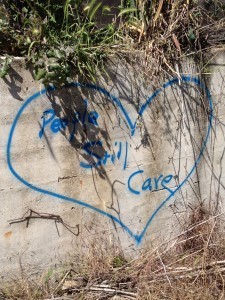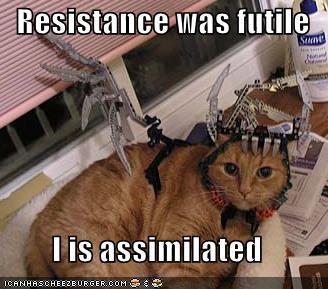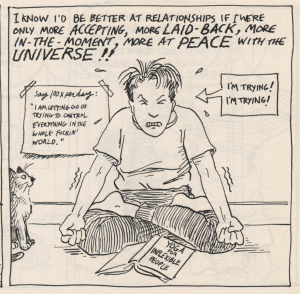Sara Ryan's Blog, page 16
July 20, 2012
Interview with Hanne Blank, author of Straight: the surprisingly short history of heterosexuality
Hanne Blank was gracious enough to answer a couple of questions for me about her super-fascinating book Straight: the surprisingly short history of heterosexuality. First, watch the trailer:
SR: You do such a good job of clearly explaining the fraught socio-historico-politico- other-things-that-end-in-O context in which the category of heterosexuality was invented, and I love the way you mix dense scientific, historical, and anthropological background on the ways we’ve perceived sexuality & gender roles with humor and pop culture references.
One thing I especially loved was learning about the existence of ‘doxa‘ — just the fact that there’s a name for “the things that everyone ‘knows’ are true but are in fact totally bound up in culturally-constructed assumptions.” If you could change one piece of the doxa in contemporary U.S. attitudes toward sexual identity, what would it be and why? (There’s a certain ‘pull one brick out and the whole edifice crumbles’ quality to this question, I realize.)
HB: I love this question. I often get asked “what do you think would happen if we just abolished the word ‘heterosexual’?” and I always have to say “I think we’d just find another way to talk about it because we’ve built a whole culture around the idea that this thing exists, and it’d be really hard to change the whole culture but really easy to just find another word or phrase.”
This is a much more interesting question!
I think that if I could change one thing about the way that we think about, talk about, and “do” sexual identity in the US today, I think it’d simply be to have people realize that the whole concept of “sexual identity” is entirely optional, and not inevitable or endemic to the human condition. It’s not an integral part of the human organism, it’s an idea we use to talk about ourselves, what we feel, and what we do. There is, in fact, no requirement that anyone have or feel or be able to articulate anything like a “sexual identity,” let alone that such a “sexual identity” be of one particular type or another, or that it form any part of how we treat other people or ourselves. In fact, for most of the history of humanity, no such concept existed and we got along just fine. It still doesn’t exist for some cultures, and they seem to manage okay too.
SR: Was there anything you discovered in your research that especially surprised you, and/or challenged your beliefs about sexuality?
HB: I knew going in to work on this book that “heterosexual” was at least as much of a tool to control people with as it ever has been “just” a label or a category or a tool to think with. I was constantly amazed by the degree to which “heterosexual” does this by behaving rather like the fictional Borg from Star Trek: The Next Generation — by encompassing behavior or attitudes traditionally identified with the non-heterosexual, for instance oral sex, or anal sex — and thereby “adding their distinctiveness to our own” where it can be watched over and shaped by the dominant heteronormative culture and its priorities.
The last chapter of the book deals with this in some specific directions and ways, looking at how heteronormativity has assimilated (or not) things like same-sex sexual behavior among hetero-identifying people, genderqueer and transgender lives, advanced fertility and reproductive technology, and so on. It’s necessarily incomplete, that chapter, because we’re still playing out, as a culture, that particular pattern of creating and re-creating “heterosexual,” and probably will be until the concept of “heterosexual” breaks under the strain of holding too much.
I also really enjoyed learning about how the notion of “heterosexual” (and “homosexual” too) got exported to non-Western cultures. This is something I didn’t write about in the book, because it got a bit too far afield for my scope, but it was fascinating to me to read what other researchers had to say about how introducing Western ideas of “sexual identity” or “sexual orientation” to cultures that had never used such notions — for instance in China — had changed the ways those cultures thought about and practiced sex and relationships. It was amazing to read about what happens when cultures acquire what is to them a brand new idea about sexuality that they had never previously had a use for, an idea that simultaneously seems so fundamental and unquestionable in our own culture. It really brought home to me the fact that while all human beings share a capacity we can call “sexuality,” sexuality doesn’t look, sound, feel, or act the same way for everyone, and that this can be as true on a cultural level as it can be on an individual one.
July 14, 2012
Book recommendations from the BGL retreat
One of the things we did at retreat was, inevitably, recommend books to each other. I did not record who recommended what, but here follows the eclectic selection of titles that came up during one of our discussions.
Links are to the authors’ own sites when possible, both because I just think that’s preferable and because I’m in the midst of planning to redesign mine and so hey, here are a bunch of examples of how folks are designing author sites.
Grave Mercy, Robin LaFevers
Anna and the French Kiss, Stephanie Perkins
I Hunt Killers, Barry Lyga
The Night Circus, Erin Morganstern
A Monster Calls and The Knife of Never Letting Go, Patrick Ness
Deathless, Catherynne M. Valente
Mechanique, Genevieve Valentine
Ashfall, Mike Mullin
The Troupe, Robert Jackson Bennett
The Girls of No Return, Erin Saldin
Wonder, R.J. Palacio
Out Of My Mind, Sharon Draper
A Greyhound Of A Girl, Roddy Doyle
Are You My Mother?, Alison Bechdel
Code Name Verity, Elizabeth Wein
The Wicked and the Just, J. Anderson Coats
Writing The Other, Nisi Shawl and Cynthia Ward
Fatale, Ed Brubaker & Sean Philips
Anya’s Ghost, Vera Brosgol
Courtney Crumrin and the Night Things, Ted Naifeh
Girl of Fire and Thorns, Rae Carson
Slaughter-House Five, Kurt Vonnegut
Don’t Sleep, There Are Snakes, Dan Everett
Wherever I Wind Up, R. A. Dickey
Let’s Pretend This Never Happened, Jenny Lawson
Wild, Cheryl Strayed
Lone Survivor, Marcus Luttrell
War, Sebastian Junger
The Things They Carried, Tim O’Brien
On Killing, Dave Grossman
The Wednesdays, Julie Bourbeau
Altered, Jennifer Rush
Charlie Joe Jackson’s Guide to Not Reading, Tommy Greenwald
The Strange Case of Origami Yoda, Tom Angleberger
The People vs. George Lucas (a documentary, not a book, but came up as a sidebar to Origami Yoda)
Radiant Days, Elizabeth Hand
Signal to Noise, Neil Gaiman and Dave McKean
Daughter of Smoke and Bone, Laini Taylor
Only Begotten Daughter, James Morrow
…and finally at the end of that long list I also jotted down an unrelated, unattributed quote: “Cleavage is kind of the beard for ladies.” I don’t remember who said it, but I believe the context was Things On A Body Wherein Food Can Accumulate.
July 9, 2012
Re-entry

Usually I try to give myself a day after retreat to adjust. That wasn’t possible this year.
After I got home, I did take a walk and watch a tremendous sunset (see above) that my phone unsurprisingly failed to render in its full glory, but that was it.
So after a few days of nonstop connecting and reconnecting, sharing (among other things) ideas, book recommendations, thrilling true tales of the publishing industry, and everyone’s favorite hilarious and/or alarming online videos, I ricocheted right back into my quotidian place.
Except that place is different. Literally different; in dayjobland, I’m moving offices, by which I mean cubicles, for the first time in over a decade. I have the same job, but I’ve got a new boss. (“That means you don’t have the same job,” said a friend, helpfully.)
There are other changes, too. Circumstances are combining to make me realize that in more than one context, Hey, I’ve been doing this for a while. I know some stuff.
I certainly don’t know All The Stuff. I need to be constantly ready both to learn new Stuff and to unlearn Stuff I thought I knew, but is now Different. I need to make sure I keep challenging my assumptions, seeking out other perspectives, honing my various crafts, and generally not getting stagnant — but, in sum: Stuff. I Know Some.
(And I can make other stuff up. Which, of course, in some cases is the whole point.)
July 6, 2012
Small collection of posts on writing comics
Folks have asked, so here are all the posts I’ve done about writing comics:
Getting a robot to make you a sandwich and other tips for writing comics
More tips on writing comics: what artists wish you wouldn’t do, part one
What artists wish you wouldn’t do, part two
What artists wish you wouldn’t do, part three
And a little post on choosing on whether a particular project should be prose or a graphic novel: Because interpretive dance is not an option
I am happy to write more posts on this topic, and answer questions if readers have them!
July 3, 2012
Advancing to retreat, or vice versa
It is almost time for the annual BG Literary client retreat, and I am excited.
It’s a retreat for writers, yes. But it’s not a retreat that is primarily about solitary, quiet writing time — although it is always okay to remove yourself from the group to take that time.
It’s primarily about community. Learning from each other. Getting the chance to, whatever else you need to do and/or be in the rest of your life, just be your writer-self for a while and talk about business and craft with people who get it.
Basically, even with the publishing landscape ever-shifting and anxiety-inducing, retreat makes you feel like this:

(Image is a blue heart shape spray-painted on a concrete wall, with the phrase ‘People Still Care’ spray-painted inside.)
Looking forward to seeing old friends and meeting new ones. I’ll miss those compatriots who aren’t able to make it this year; to y’all I say, next year in — well, probably not Jerusalem, but you never know.
June 29, 2012
Five things
It is Friday, after all.
1. I have given up hunt-and-pecking on my phone in favor of two-thumbed texting. I make more typos, but I think it’s still faster overall. Also, makes me feel like I am still capable of learning new things, thus, win.
2. Finally read The Manual of Detection, which I liked a whole bunch, and think would be good to discuss in combination with Claire DeWitt and the City of the Dead.
3. Listening to We Are Anonymous, which also has a good companion read in Epic Win For Anonymous, especially if you, like me, are fascinated by online communities and how people affiliate with them, or really with anything (sports teams, political parties, etc.) that is a way of claiming a particular type of identity.
4. Trying to figure out how to not be scared of GoodReads. I have made an author page there but I have not, shall we say, fleshed it out or visited it much. I just hate star rankings and they make me anxious and I also hate that they’re the first thing you see. Writers on GoodReads, how do you manage it?
5. Here is a robot in a bow tie. Okay it is not actually a robot, but it is deliberately robotesque:

June 27, 2012
The Carnival
Last month I was fortunate to visit the Musée Mechanique (warning: plays music when you click). It is an experience I definitely recommend. My favorite thing was the Carnival.
These photos do not capture the actual motion, which is kind of the whole point, but you can see the loving detail with which the builder, a carny himself, replicated his environment in miniature.
Oh but wait! As soon as I’d typed the above, it occurred to me that of course many many people besides me admire the Carnival, and most likely someone had indeed captured it while operating. And indeed, thanks to Kevin Syoza, you can see it in action:
June 24, 2012
Project Write Faster, week one
Inspired by a lot of folks, notably Holly Black, I decided to see if I could tweak my schedule in such a way that I would end up writing more than, well, about 700 words per week.
For a while (I won’t tell you how long) I’d only been managing to block out time to work on my manuscript once a week, on a weekend day. Which, granted, was certainly better than no writing at all. But the snail-esque quality of the resulting pace was making me anxious. Plus, despite what I said on the topic in 2008, I’m coming around to thinking that writing every day, or as close to every day as I can possibly manage, will be Good.
But given that I have:
– a full-time dayjob which I have no intention of quitting any time soon
– a desire to work out several times per week
– the usual assortment of errands of lesser and greater urgency
– an ever-decreasing capacity to tolerate chronic sleep debt
…there were a limited number of ways in which said schedule-tweaking could occur.
My plan: minimize the need to decide to write by making it as easy as possible; do the writing equivalent of packing my gym bag the night before.
Because I’ve managed (knock wood) to make working out a routine by doing it first thing in the morning, I reasoned that I could get up even a little earlier and write, then work out, then go to dayjob. To set myself up for success, I’d turn off my wifi and open my Scrivener document right before I went to bed, so the Internet-free laptop with my manuscript would be the first thing I’d see when I woke up. Here’s what happened during the first week.
Saturday 6/16
Breakfast, long workout, then 800 words in 2 hours at the coffeeshop, with Freedom deployed
Sunday 6/17
7 A.M.: 300 words before anyone else was up, at different coffeeshop, with Freedom. Then breakfast, then gym.
2 P.M.: At studio, without computer, scene outlining in longhand. Not sure how many words, because longhand.
Monday 6/18
4 A.M.: 278 words with the wifi turned off, making lemonade out of the lemons of having woken up even earlier than I’d intended. Workout afterwards predictably lackluster.
Tuesday 6/19
6 A.M.: 250 words before breakfast, then gym.
Wednesday 6/20
5 A.M.: 109 insomnia-fueled words in half an hour before staggering back to bed, missing gym + finally getting up at 8
Thursday 6/21
Didn’t have to go to dayjob because I’ll be working through the weekend at ALA. Breakfast, long workout, haircut, then:
2 P.M.: Writing date. 780 words in 2 hours, with wifi turned off.
Friday 6/22
Another insomniac night, as is traditional for me pre-travel. Arrived at airport early with every intention of writing while waiting to board. Intentions foiled by purchase of Wendy McClure’s awesome THE WILDER LIFE. Thought I might write on the plane, but mostly dozed. Half-woke up with an idea for strengthening a subplot, typed myself a brief note, then shut my eyes and half-replotted, half-daydreamed scenes that will need to be revised & added in light of the new idea.
Saturday 6/23
Back-to-back meetings/sessions/gatherings from 8 AM – 11 PM made both writing and working out non-doable. But I walked a fair amount, and one of the aforementioned gatherings was with my agent.
TOTAL FOR WEEK 1: words: 2500, workouts, 5, of varying duration & quality
Caveats: Having a weekday on which I was able to do a long writing stint is not typical. Hoping the insomnia is also not typical. And having a conference in the middle of things results in a trifecta of atypicality. That said: dang, that is a lot more words than I’ve been averaging.
I don’t intend to do this kind of detailed documentation every week, because I think all of you who have not already tiptoed quietly away will vanish from this blog. But so far it sure seems like morning Internetless writing is a Thing that may be Useful.
June 15, 2012
In which my dad is cranky about circuses to Marion Zimmer Bradley.
It’s about to be Father’s Day. My dad died in 2008, and I miss him all the time, but especially now, when the media is incessantly suggesting things I should buy for him, and other people are talking about what they plan to do for and/or with their dads.
I miss him, but I have some coping strategies. One of them is to read his writing. I’m fortunate to have a lot of it, including all the science fiction fanzines he produced in the 1950s and early 1960s.
I’ve posted several excerpts from his zines over the years. They really are proto-blogs, and at least in his case, the content is about evenly divided between original material and what would now be posted as comments on other people’s blogs. As you might expect, it’s tricky to find selections from his comments that don’t depend on being able to read the zine on which he’s commenting. I think the one below can stand on its own, though. It’s likely that this issue is what he was responding to; it’s interesting that Marion Zimmer Bradley reused the title of her zine for a novel that she published significantly later.
I love how unimpressed Dad is with circus; the irony of the fact that I’ve written, to date, four stories about circus performers, and hope to write more in future, does not escape me. Here he is, from Bandwagon #6, summer 1960:
Catch Trap (Bradley) : For some reason, trapeze artists, high-wire walkers, jugglers and trained animals bore me to tears. And I lump them together because they seem all of a piece — all part of the gaudy-tawdry circus milieu. Kids are supposed to be/have been fascinated by circuses, but I don’t recall ever having been. I went to a couple. They stank. Moth-eaten animals panting inside cramped, hot cages; clowns in cheap outfits practising broad “humor;” over-priced, wormy peanuts; dirty narrow seats; and the constant, cynical importuning. I lamented the passing of the circus about as much as I would the passing of the Ed Sullivan show.
June 12, 2012
Planning for the unplanned things that will disrupt your plans
Two phrases have been repeating themselves in my head a lot lately: actions are decisions, and the illusion of control. The latter has a way of disrupting the former, and I’ve been trying to come to terms with their inevitable intersection.
If that seems needlessly obscure, let me rephrase.
I’m working on being more conscious about how the things I do on a micro, day-to-day level have macro-scale results (e.g.: working out, writing). The way we spend our days is the way we spend our lives, and all like that.
And at the same time, I want to remember that there will always be curveballs lobbed, spanners in works, and shit intersecting violently with fans. I know I can’t plan for everything that will affect my ability to accomplish what I want to accomplish — as much as I would really, really like to!
(N.B.: If you know me In Real Life and are under the impression that I actually am laid back, don’t be fooled! That just means I’m doing a swell job on my mellow façade.)
But at least I can anticipate that there are gonna be things I can’t anticipate, right?
Y’all out there, when estimating your schedules for large projects like, say, writing novels, how do you build in time for dealing with all the things that get in the way of DOING ALL THE THINGS?





